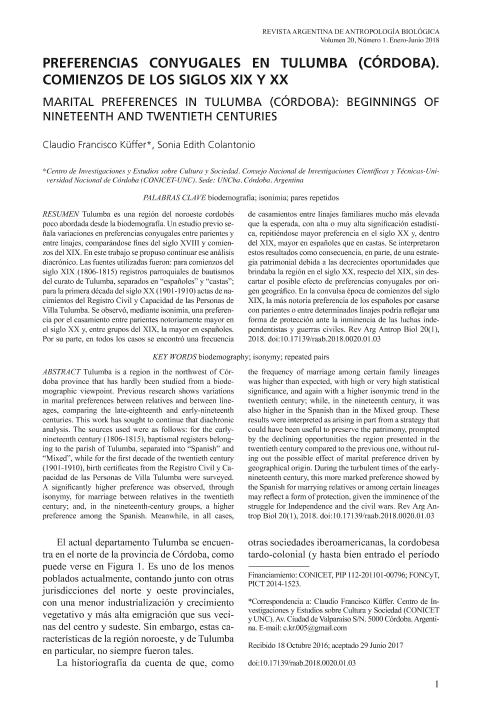Mostrar el registro sencillo del ítem
dc.contributor.author
Küffer, Claudio Francisco

dc.contributor.author
Colantonio, Sonia Edith

dc.date.available
2020-01-03T17:41:19Z
dc.date.issued
2017-12
dc.identifier.citation
Küffer, Claudio Francisco; Colantonio, Sonia Edith; Preferencias conyugales en Tulumba (Córdoba). Comienzos de los siglos XIX y XX; Asociación de Antropología Biológica Argentina; Revista Argentina de Antropología Biológica; 20; 1; 12-2017; 1-11
dc.identifier.issn
1514-7991
dc.identifier.uri
http://hdl.handle.net/11336/93423
dc.description.abstract
Tulumba es una región del noroeste cordobés poco abordada desde la biodemografía. Un estudio previo señala variaciones en preferencias conyugales entre parientes y entre linajes, comparándose fines del siglo XVIII y comienzos del XIX. En este trabajo se propuso continuar ese análisis diacrónico. Las fuentes utilizadas fueron: para comienzos del siglo XIX (1806-1815) registros parroquiales de bautismos del curato de Tulumba, separados en “españoles” y “castas”; para la primera década del siglo XX (1901-1910) actas de nacimientos del Registro Civil y Capacidad de las Personas de Villa Tulumba. Se observó, mediante isonimia, una preferencia por el casamiento entre parientes notoriamente mayor en el siglo XX y, entre grupos del XIX, la mayor en españoles. Por su parte, en todos los casos se encontró una frecuencia de casamientos entre linajes familiares mucho más elevada que la esperada, con alta o muy alta significación estadística, repitiéndose mayor preferencia en el siglo XX y, dentro del XIX, mayor en españoles que en castas. Se interpretaron estos resultados como consecuencia, en parte, de una estrategia patrimonial debida a las decrecientes oportunidades que brindaba la región en el siglo XX, respecto del XIX, sin descartar el posible efecto de preferencias conyugales por origen geográfico. En la convulsa época de comienzos del siglo XIX, la más notoria preferencia de los españoles por casarse con parientes o entre determinados linajes podría reflejar una forma de protección ante la inminencia de las luchas inde-pendentistas y guerras civiles.
dc.description.abstract
Tulumba is a region in the northwest of Cór-doba province that has hardly been studied from a biode-mographic viewpoint. Previous research shows variations in marital preferences between relatives and between line-ages, comparing the late-eighteenth and early-nineteenth centuries. This work has sought to continue that diachronic analysis. The sources used were as follows: for the early-nineteenth century (1806-1815), baptismal registers belong-ing to the parish of Tulumba, separated into “Spanish” and “Mixed”, while for the first decade of the twentieth century (1901-1910), birth certificates from the Registro Civil y Ca-pacidad de las Personas de Villa Tulumba were surveyed. A significantly higher preference was observed, through isonymy, for marriage between relatives in the twentieth century; and, in the nineteenth-century groups, a higher preference among the Spanish. Meanwhile, in all cases, the frequency of marriage among certain family lineages was higher than expected, with high or very high statistical significance, and again with a higher isonymic trend in the twentieth century; while, in the nineteenth century, it was also higher in the Spanish than in the Mixed group. These results were interpreted as arising in part from a strategy that could have been useful to preserve the patrimony, prompted by the declining opportunities the region presented in the twentieth century compared to the previous one, without rul-ing out the possible effect of marital preference driven by geographical origin. During the turbulent times of the early-nineteenth century, this more marked preference showed by the Spanish for marrying relatives or among certain lineages may reflect a form of protection, given the imminence of the struggle for Independence and the civil wars.
dc.format
application/pdf
dc.language.iso
spa
dc.publisher
Asociación de Antropología Biológica Argentina
dc.rights
info:eu-repo/semantics/openAccess
dc.rights.uri
https://creativecommons.org/licenses/by-nc-sa/2.5/ar/
dc.subject
BIODEMOGRAFÍA
dc.subject
ISONIMIA
dc.subject
PARES REPETIDOS
dc.subject.classification
Otras Ciencias Biológicas

dc.subject.classification
Ciencias Biológicas

dc.subject.classification
CIENCIAS NATURALES Y EXACTAS

dc.subject.classification
Ciencias Sociales Interdisciplinarias

dc.subject.classification
Otras Ciencias Sociales

dc.subject.classification
CIENCIAS SOCIALES

dc.title
Preferencias conyugales en Tulumba (Córdoba). Comienzos de los siglos XIX y XX
dc.title
Marital preferences in Tulumba (Córdoba): Beginnings of nineteenth and twentieth centuries
dc.type
info:eu-repo/semantics/article
dc.type
info:ar-repo/semantics/artículo
dc.type
info:eu-repo/semantics/publishedVersion
dc.date.updated
2019-10-24T18:18:36Z
dc.identifier.eissn
1853-6387
dc.journal.volume
20
dc.journal.number
1
dc.journal.pagination
1-11
dc.journal.pais
Argentina

dc.journal.ciudad
La Plata
dc.description.fil
Fil: Küffer, Claudio Francisco. Consejo Nacional de Investigaciones Científicas y Técnicas. Centro Científico Tecnológico Conicet - Córdoba. Centro de Investigaciones y Estudios sobre Cultura y Sociedad. Universidad Nacional de Córdoba. Centro de Investigaciones y Estudios sobre Cultura y Sociedad; Argentina
dc.description.fil
Fil: Colantonio, Sonia Edith. Consejo Nacional de Investigaciones Científicas y Técnicas. Centro Científico Tecnológico Conicet - Córdoba. Centro de Investigaciones y Estudios sobre Cultura y Sociedad. Universidad Nacional de Córdoba. Centro de Investigaciones y Estudios sobre Cultura y Sociedad; Argentina
dc.journal.title
Revista Argentina de Antropología Biológica
dc.relation.alternativeid
info:eu-repo/semantics/altIdentifier/url/https://revistas.unlp.edu.ar/raab/article/view/2860
dc.relation.alternativeid
info:eu-repo/semantics/altIdentifier/doi/http://dx.doi.org/10.17139/raab.2018.0020.01.03
dc.relation.alternativeid
info:eu-repo/semantics/altIdentifier/url/https://www.redalyc.org/jatsRepo/3822/382253547003/index.html
Archivos asociados
